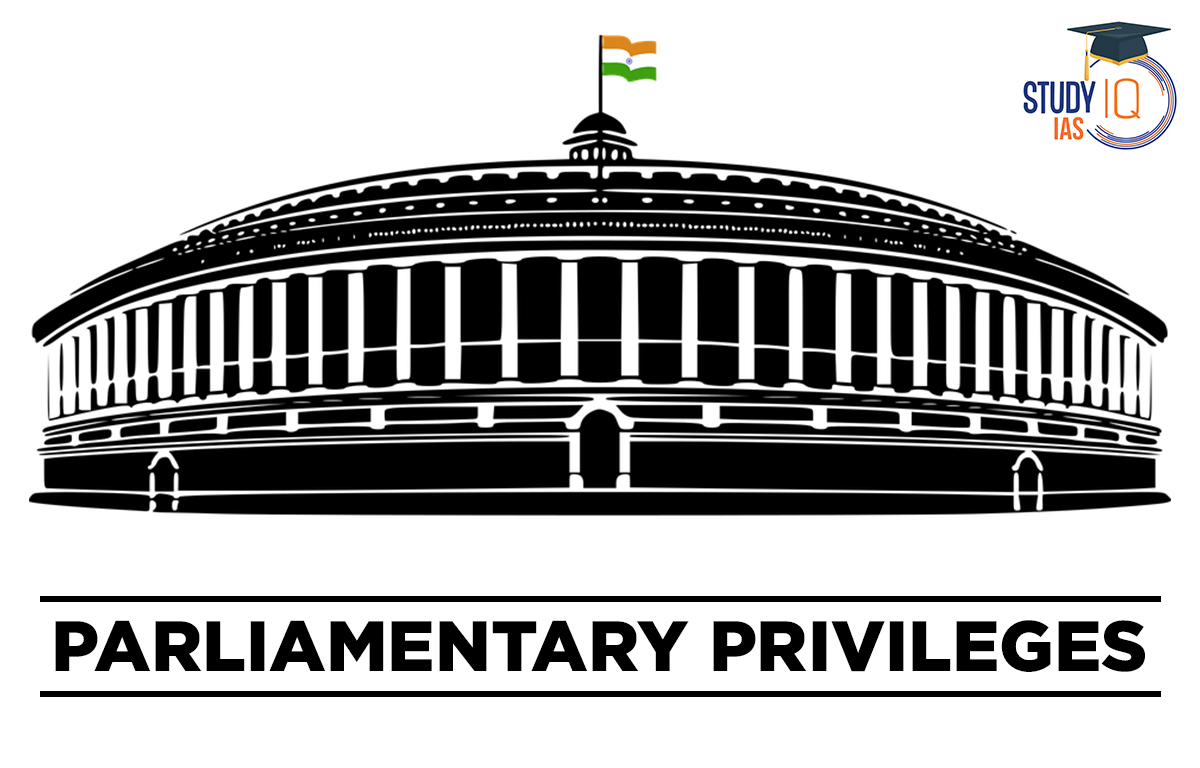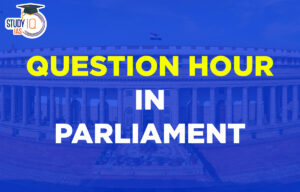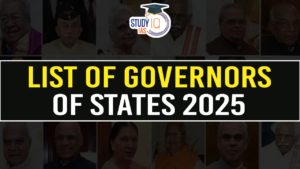Table of Contents
Parliamentary Privileges
Parliamentary privileges are mentioned in Article 105 of the Indian Constitution. Members of Parliament are protected from civil or criminal liability for statements made or actions taken while performing their duties. These privileges apply only while they are members; once they leave, the privileges end. Such privileges are important for carrying out their constitutional responsibilities smoothly and without disruption. The Parliamentary Privileges is an important part of Indian Polity which an important subject in UPSC Syllabus. Students can also go for UPSC Mock Test to get more accuracy in their preparations.
Parliamentary Privileges History
Parliamentary rights are taken directly from the British Constitution by the Indian Constitution. Other aspects including parliamentary government, the rule of law, legislative procedure, single citizenship, the cabinet system, prerogative writs, and bicameralism are also derived from the British Constitution. Articles 79 to 122 of the Indian Constitution, among other laws, outline the privileges of the Indian parliament.
In a legal context, the Government of India Act of 1935 provided freedom of speech. A few of the privileges of the House, its representatives, and committees are stated in the Constitution, and there are still some laws and procedural regulations in place for the House. Other parliamentary privileges, however, continue to be subject to the House of Representatives’ rulings.
The Indian Constitution’s primary articles 105 and 122 deal with the privileges of Parliament, whereas articles 194 and 212 deal with the same privileges for the states. According to Article 105 (1) of the Indian Constitution, there is freedom of speech in the Parliament, in accordance with the provisions of the Constitution and the rules and written instructions controlling the functioning of Parliament.
Understand the meaning of Parliamentary Privilege
Parliamentary privileges, which are exceptional rights or advantages, are granted to members of legislatures everywhere in the globe. In most democracies, the legislatures and its members receive special benefits in order to function successfully. Even though it is a part of the law of the state, privilege is in some ways an exception to the usual law. Privilege is to Parliament what prerogative is to the Crown, it would not be incorrect to state. The House of Parliament can exercise privileges without assistance from or interference from Parliament or courts, just as the Crown is free to do so without their help or interference.
India is one of the few instances in history where representative institutions were slowly introduced and developed by a foreign authority. The Lok Sabha and Rajya Sabha’s privileges and immunities are referred to as parliamentary privileges in India.
Origin of Parliamentary Privilege
The Charter Act of 1833 introduced a fourth member to the governor-general’s council, marking the start of Parliamentary Privileges in India. This created a new legislative framework that laid the groundwork for a full legislative body. With the Indian Council Act of 1909, indirect elections to the legislature reduced official opposition to these privileges. The Government of India Act of 1935 further guaranteed freedom of speech within the legislative process. There are currently some legislation and rules of procedure for the House, and some of the privileges of Parliament, its members, and Parliament Committees are outlined in the Constitution. However, other privileges are still reliant on the precedents of the House of Commons.
The Indian Constitution’s main articles 105 and 122 deal with the privileges of Parliament, whereas articles 194 and 212 deal with the same privileges for states. There is freedom of speech in the Parliament, subject to the provisions of the Constitution and the rules and standing orders governing the procedure of Parliament, according to Article 105 (1) of the Indian Constitution.
Parliamentary Privileges Constitutional Provisions
Under Articles 105 and 194, the members of the two houses of parliament’s committees are given particular rights, privileges, and exemptions. The Attorney General of India and Union Ministers are among those who are granted these powers if they speak or participate in any committee of the Parliament. The president, a member of the parliament, is not entitled to these privileges.
Article 105 (3) was modified by the 44th Amendment to the Constitution of India and now has two parts. Each House of Parliament, its Members, and Committees shall have the authority, privileges, and immunities as may be prescribed by law from time to time by the Parliament. If Parliament doesn’t define these rights, privileges, or immunities specifically, they’ll be the same as what the House of Commons had on January 26, 1950. Although the House of Commons has not been specifically mentioned in Article 105 (3), these privileges still exist until Parliament passes a law.
Parliamentary Privilege Types
There are two categories of parliamentary privileges in India: those that are explicitly documented and catalogued and those that are acknowledged but not paid for.
Individual Parliamentary Privileges
These are the legal privileges that each Member of Parliament enjoys. For instance, MPs are not compelled to serve on juries, are allowed to express their opinions in the House, and are not permitted to be held in civil cases 40 days before or after the commencement of the current session of Parliament. A member of the legislature may not be detained while it is in session. Members may not also be imprisoned 40 days before or after the start or end of the session.
Inside the chambers, lawmakers have the right to free speech. As a result of their comments made in the parliament or its committees, they are not the target of any legal action. However, the regulations govern it.
Collective Parliamentary Privileges
The ability to publish talks, reports, and proceedings while also preventing others from doing the same. It is permitted to publish accurate reports of judicial proceedings without the House’s permission under press freedom. However, in instances of secret House meetings, this right of the media is not applicable.
Keep strangers away from the gathering, and set up private sessions to talk about crucial issues. Make rules to manage its own operations and business affairs and to make decisions regarding such issues. The right to immediate notification of an individual’s arrest, detention, guilty verdict, imprisonment, and release exists. Ask inquiries and request to be seen. The courts cannot review the actions of a House or its committees.
Benefits of Parliamentary Privileges
Parliamentary privileges help reduce tensions between the executive and legislative branches of government, fostering friendship and cooperation. This collaboration allows for faster and more effective decision-making. In a parliamentary system, the legislative and executive branches work together, requiring fewer staff and resources compared to a presidential system where each branch operates separately. The shared responsibilities in a parliamentary government encourage good administration and motivate cabinet members to perform well. Additionally, this system promotes transparency and honesty.
Parliamentary Privileges Issues
While a parliamentary system may seem to always favor good governance, it can also breed too confident and strong lawmakers, which can result in the abuse of political power. The legislative system will elevate and make untouchable members of parliament.
The prime minister is devoted to his party rather than the country’s citizens since, in a parliamentary system of government; he is directly elected as the head of his party. He will therefore have a greater loyalty to his party than to his people. The prime minister’s position is unquestionably unstable in a parliamentary system of government because the legislature has the power to remove him at any time with a “vote of no confidence.” This might lead to a crisis, segregation, or unstable governance.
Due to the convergence of legislative and executive responsibilities, members of the cabinet may be overworked and certain ministers may not be able to keep up. Finally, it is important to keep in mind that, although if the parliamentary system requires people to undertake both legislative and executive duties, a minister’s lack of expertise may lead to inefficiencies in one arm of the government’s control.
Punishments for Breaching Privileges
- Imprisonment: For serious breaches, a member or person can be imprisoned.
- Fines: If the breach involves economic gain, Parliament can impose a fine on the offender.
- Prosecution: Parliament can prosecute anyone who commits a breach.
- Punishment for Members: If a member commits contempt, the House itself can punish them, which may include suspension from the House.
What Defines a Parliamentary Breach or Contempt of the House?
There is no clear list defining actions that constitute a breach or the punishments for it. However, certain behaviors are generally viewed as contempt if they disrupt House proceedings. Here are some key points:
Misleading Statements: Making false statements with the intent to mislead the House is considered contempt. If the speaker genuinely believes the information is true, it’s not a breach.
Outsider Disturbances: Actions like shouting slogans or throwing leaflets that disrupt House proceedings are treated seriously. Offenders may face imprisonment or warnings.
Assault on Members: Attacking a member while they are performing their duties is seen as contempt.
Defaming Members: Any published speech or writing that damages a member’s reputation is considered contempt, as it affects their ability to function.
In general, any attack on the privileges of members is a breach, and Parliament can take action against it.
Freedom of Press and Parliamentary Privileges
Parliamentary privileges can limit press freedom, which is a fundamental right. The press must be careful when reporting on parliamentary proceedings. They can be held in contempt for:
- Publishing defamatory content about members.
- Prematurely releasing details of proceedings.
- Misreporting or misrepresenting events.
- Sharing expunged parts of the proceedings.
Despite these restrictions, certain laws protect press freedom. For example, the Parliamentary Proceedings (Protection of Publication) Act, 1977 allows for press reports if they are:
- Substantially true.
- Made without malice.
- In the public interest.
- Not about secret meetings.
Conclusion
Privileges are given to members of Parliament to ensure its smooth functioning, but they must align with fundamental rights since these members represent and work for our welfare. If privileges conflict with fundamental rights, it undermines democracy and citizens’ rights. Parliament has a duty to uphold all constitutional rights. Members should use their privileges wisely and avoid misuse, remembering that power should not lead to corruption. While Parliament can’t adopt all privileges from the House of Commons, it should choose those that fit Indian democracy.
Parliamentary Privileges UPSC
Legislative Privileges Indian Polity, which is fairly distinct from other themes, is covered in the UPSC topic. In order for the parliament to function effectively, members are given privileges. The foundation of democracy will be lost if privileges are not granted in accordance with fundamental rights, which are necessary to protect citizens’ rights. It is the duty of the parliament to respect all other rights guaranteed by the constitution. They must always keep in mind that their powers do not make them evil. Students can read all the details related to UPSC by visiting the official website of StudyIQ UPSC Online Coaching.


 Question Hour in Parliament: Meaning, Ty...
Question Hour in Parliament: Meaning, Ty...
 List of Governor of States in India, Con...
List of Governor of States in India, Con...
 Maharashtra Bill to Curb Urban Naxalism,...
Maharashtra Bill to Curb Urban Naxalism,...





















